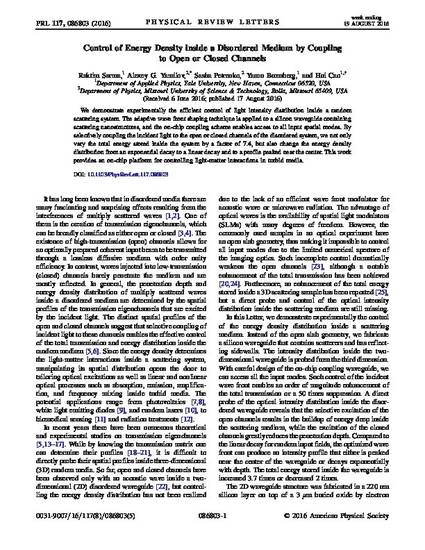
Article
Control of Energy Density inside a Disordered Medium by Coupling to Open or Closed Channels
Physical Review Letters
Abstract
We demonstrate experimentally the efficient control of light intensity distribution inside a random scattering system. The adaptive wave front shaping technique is applied to a silicon waveguide containing scattering nanostructures, and the on-chip coupling scheme enables access to all input spatial modes. By selectively coupling the incident light to the open or closed channels of the disordered system, we not only vary the total energy stored inside the system by a factor of 7.4, but also change the energy density distribution from an exponential decay to a linear decay and to a profile peaked near the center. This work provides an on-chip platform for controlling light-matter interactions in turbid media.
Department(s)
Physics
Keywords and Phrases
- Atomic Physics,
- Adaptive Wave Fronts,
- Control Of Energies,
- Efficient Control,
- Energy Density Distributions,
- Exponential Decays,
- Light Intensity Distribution,
- Light-matter Interactions,
- Random Scattering, Wavefronts
Document Type
Article - Journal
Document Version
Final Version
File Type
text
Language(s)
English
Rights
© 2016 American Physical Society (APS), All rights reserved.
Publication Date
8-1-2016
Publication Date
01 Aug 2016
Disciplines
Citation Information
Raktim Sarma, Alexey Yamilov, Sasha Petrenko, Yaron Bromberg, et al.. "Control of Energy Density inside a Disordered Medium by Coupling to Open or Closed Channels" Physical Review Letters Vol. 117 Iss. 8 (2016) p. 086803-1 - 086803-5 ISSN: 0031-9007 Available at: http://works.bepress.com/alexey-yamilov/42/
